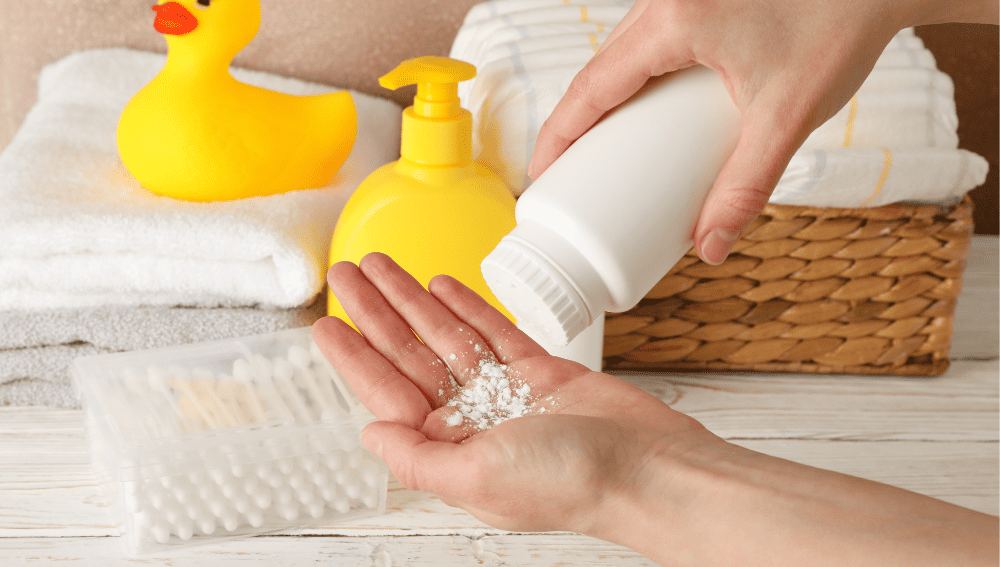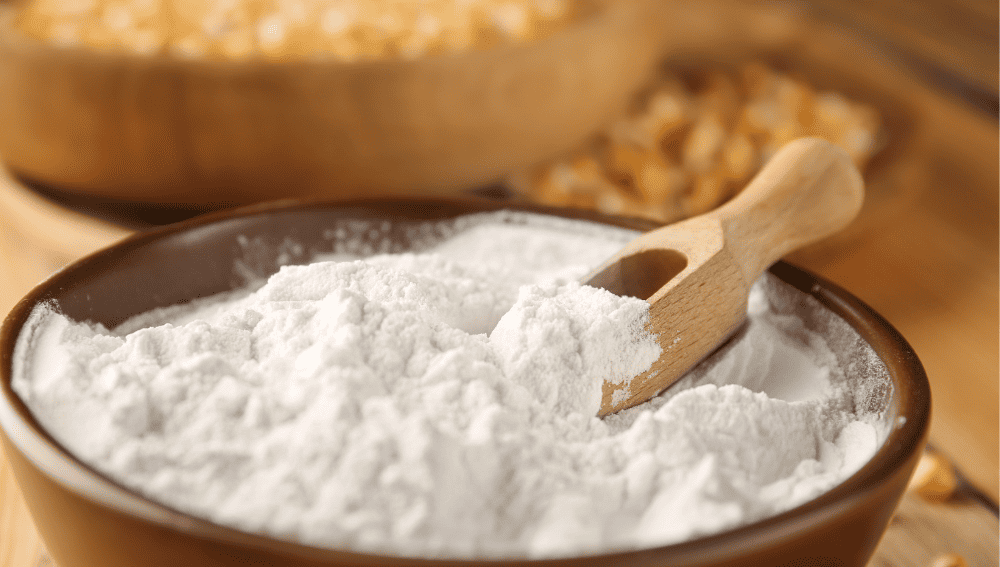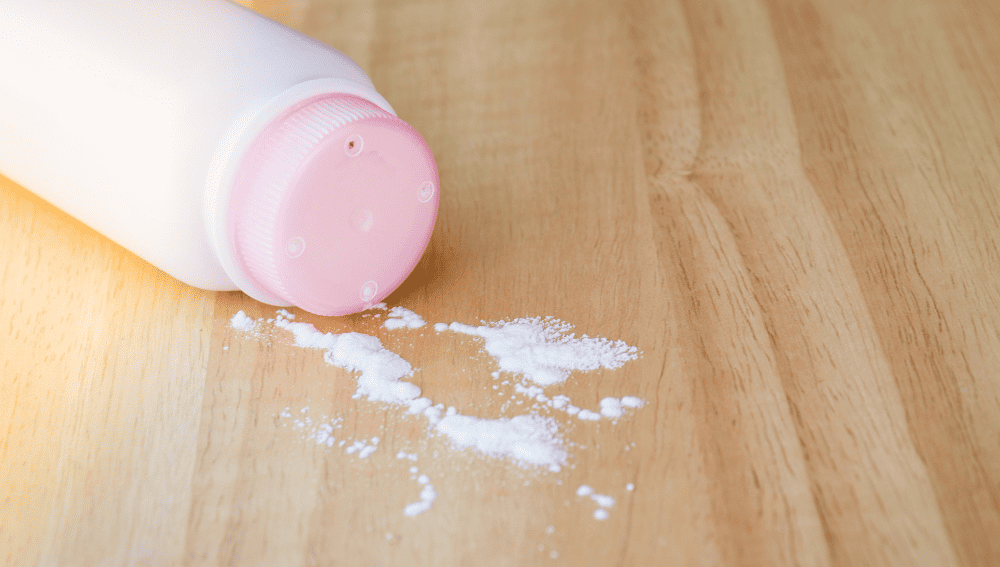Cornstarch has become a popular alternative to traditional baby powder. While baby powder has been used for generations to keep babies dry and prevent diaper rash, concerns about its safety have led many parents to seek out other options.
Cornstarch is a natural and affordable alternative that is gaining popularity among parents and caregivers.
Understanding the differences between baby powder and cornstarch is important when deciding which product to use. Traditional baby powder is made from talc, a mineral that has been linked to health risks such as respiratory problems and cancer.
Cornstarch, on the other hand, is made from corn and is considered safe for use on babies’ delicate skin. It is also an effective way to absorb moisture and prevent diaper rash.
Key Takeaways
- Cornstarch is a natural and affordable alternative to traditional baby powder.
- Traditional baby powder is made from talc, which has been linked to health risks.
- Cornstarch is considered safe for use on babies’ delicate skin and is an effective way to absorb moisture and prevent diaper rash.
Understanding Baby Powder
Baby powder has been a popular product used for decades to prevent diaper rash and keep skin dry and fresh. It is typically made from either talc or cornstarch and is applied to a baby’s skin after a diaper change or bath.
Talc, a mineral composed of magnesium, silicon, and oxygen, has been traditionally used in baby powder. However, concerns have been raised about the potential health risks associated with talc use.
Talcum powder has been linked to ovarian cancer in women who use it regularly in the genital area. In addition, talc can sometimes be contaminated with asbestos, a known carcinogen.
As a result, many manufacturers have switched to using cornstarch as a safer alternative to talc in baby powder. Cornstarch is derived from corn and is considered a natural and safe ingredient. It is also effective in preventing diaper rash and absorbing moisture.
One of the most well-known manufacturers of baby powder, Johnson & Johnson, faced numerous lawsuits over the years related to talcum powder. In 2020, the company announced that it would no longer sell talc-based baby powder in the United States and Canada.
It is important to note that not all talcum powder contains asbestos, and not all talc-based products are harmful. However, if you are concerned about the potential risks associated with talc, it may be wise to choose a baby powder made from cornstarch instead.
Overall, understanding the ingredients in baby powder and the potential risks associated with talc is important for parents and caregivers. By choosing a safe and effective product, you can help keep your baby’s skin healthy and protected.
Health Risks of Traditional Baby Powder
Traditional baby powder is made from talc, a mineral composed of magnesium, silicon, and oxygen. However, talc can be contaminated with asbestos, a known carcinogen.
Asbestos exposure can lead to mesothelioma, a rare but aggressive form of cancer that affects the lining of the lungs, abdomen, or heart.
In addition to the risk of asbestos contamination, traditional baby powder has been linked to an increased risk of ovarian cancer.
This is because talc particles can travel through the reproductive system and become embedded in the ovaries, leading to inflammation and the growth of cancerous cells.
Furthermore, inhaling talc powder can lead to respiratory issues and lung damage. Long-term exposure to talc has been associated with chronic lung inflammation and fibrosis, which can cause difficulty breathing and permanent lung damage.
To minimize the health risks associated with baby powder, many parents are turning to cornstarch-based alternatives. Cornstarch is a natural and safe alternative to talc, and it does not pose the same health risks as traditional baby powder.
Overall, the health risks associated with traditional baby powder are significant and should not be ignored. Parents should consider switching to a cornstarch-based alternative to ensure their baby’s long-term health and safety.
Why Cornstarch Instead of Baby Powder
Cornstarch is a safe and natural alternative to baby powder. It is a fine, powdery substance that is derived from the starch of corn kernels. Cornstarch is often used in cooking and baking as a thickening agent, but it can also be used as a substitute for baby powder.
One of the main benefits of using cornstarch instead of baby powder is that it is a natural product. Unlike baby powder, which may contain talc or other potentially harmful ingredients, cornstarch is a simple, cornstarch-based powder that is free from harmful chemicals.
Cornstarch baby powder is also a great alternative to traditional baby powder because it is gentle on the skin. It can help to absorb excess moisture and prevent chafing, without irritating sensitive skin.
Many parents find that cornstarch-based powders are a better choice for their babies, especially those with sensitive skin or allergies.
In addition to being a safe and gentle alternative to baby powder, cornstarch is also an affordable option. It is widely available at most grocery stores and can be purchased for a fraction of the cost of traditional baby powder.
Overall, cornstarch is a great substitute for baby powder. It is safe, natural, and gentle on the skin, making it an excellent choice for parents who want to avoid potentially harmful chemicals and irritants.
Learn more from a related post: What To Use Instead of Baby Powder
Benefits of Cornstarch Baby Powder
Cornstarch baby powder is a popular alternative to talc-based baby powders. It is made from finely ground cornstarch and is commonly used to help absorb moisture and prevent diaper rash in babies.
Here are some of the benefits of using cornstarch baby powder:
Helps Prevent Diaper Rash
Cornstarch baby powder can help prevent diaper rash by absorbing excess moisture and keeping the diaper area dry.
When a baby’s skin is wet for prolonged periods, it can become irritated and inflamed, leading to diaper rash. By using cornstarch baby powder, parents can help keep their baby’s skin dry and reduce the risk of diaper rash.
Soothes Skin Irritation and Inflammation
Cornstarch baby powder can also help soothe skin irritation and inflammation. It has natural properties that can help reduce redness and inflammation, making it a great option for babies with sensitive skin.
It can also help prevent chafing and skin irritation caused by clothing or diapers rubbing against the skin.
Absorbs Moisture
Cornstarch baby powder is a moisture-absorbing powder that can help keep babies dry and comfortable. It can be used on other parts of the body besides the diaper area, such as under the arms or on the feet, to help absorb sweat and prevent odors.
Safe for Sensitive Skin
Cornstarch baby powder is a safe option for babies with sensitive skin. It is free from harmful chemicals and fragrances that can irritate the skin. It is also hypoallergenic, making it a great option for babies who are prone to allergies or skin sensitivities.
Helps Prevent Yeast Infections
Cornstarch baby powder can also help prevent yeast infections in babies. Yeast thrives in warm, moist environments, and the diaper area can be a prime location for yeast to grow.
By using cornstarch baby powder to keep the area dry, parents can help prevent yeast infections from occurring.
In summary, cornstarch baby powder is a great alternative to talc-based baby powders. It can help prevent diaper rash, soothe skin irritation and inflammation, absorb moisture, and prevent yeast infections.
It is also safe for sensitive skin and free from harmful chemicals and fragrances.
\
Cornstarch is a popular alternative to talcum powder for baby care. However, there are several other options available that can be used as a substitute for baby powder. Here are some of the most common alternatives to baby powder:
Kaolin Clay
Kaolin clay is a natural, white clay that is used in many cosmetic and personal care products. It is gentle on the skin and has a soothing effect. Kaolin clay can be used as a talcum powder alternative as it absorbs moisture and helps to keep the skin dry.
Baking Soda
Baking soda is a versatile ingredient that can be used for a variety of purposes, including as a talcum powder alternative. It has absorbent properties that help to keep the skin dry and fresh. Baking soda can be used alone or mixed with other ingredients to make a homemade baby powder.
Talc-Free Baby Powder
Talc-free baby powder is a popular alternative to traditional talcum powder. It is made with ingredients such as cornstarch, arrowroot powder, and rice starch, which are all natural and safe for the skin.
Talc-free baby powder is ideal for babies with sensitive skin as it is free from harmful chemicals.
Arrowroot Powder
Arrowroot powder is a fine, white powder that is extracted from the roots of the arrowroot plant. It is a natural alternative to talcum powder and is gentle on the skin.
Arrowroot powder can be used as a talcum powder alternative as it helps to absorb moisture and keep the skin dry.
Rice Starch
Rice starch is a natural powder that is derived from rice. It is a popular alternative to talcum powder as it absorbs moisture and helps to keep the skin dry. Rice starch is also gentle on the skin and is ideal for babies with sensitive skin.
Oat Flour
Oat flour is a natural powder that is made from ground oats. It is a popular ingredient in many skincare products as it is gentle on the skin and has a soothing effect. Oat flour can be used as a talcum powder alternative as it helps to absorb moisture and keep the skin dry.
Tapioca Starch
Tapioca starch is a natural powder that is derived from the cassava plant. It is a popular alternative to talcum powder as it absorbs moisture and helps to keep the skin dry. Tapioca starch is also gentle on the skin and is ideal for babies with sensitive skin.
Magnesium, Silicon, and Oxygen
Magnesium, silicon, and oxygen are natural minerals that are often used in skincare products. They have absorbent properties that help to keep the skin dry and fresh. These minerals can be used as a talcum powder alternative and are safe for the skin.
Dry Shampoo
Dry shampoo is a powder that is used to absorb excess oil and sweat from the hair. It can also be used as a talcum powder alternative as it helps to absorb moisture and keep the skin dry. Dry shampoo is available in a variety of formulations and can be used on both hair and skin.
Overall, there are several alternatives to baby powder that are safe and effective. It is important to choose a product that is gentle on the skin and free from harmful chemicals.
DIY Homemade Baby Powder
For parents who prefer to use non-toxic products on their babies, homemade baby powder is a great alternative to store-bought options. It is easy to make, cost-effective, and customizable to suit individual preferences.
To make homemade baby powder, all you need is cornstarch and an essential oil of your choice. Cornstarch is a natural and safe alternative to talcum powder, which has been linked to respiratory issues.
Essential oils add a pleasant fragrance to the powder without the use of synthetic fragrances.
Here’s a simple recipe for making homemade baby powder:
- Mix one cup of cornstarch with 10-15 drops of essential oil in a bowl
- Stir well until the oil is evenly distributed throughout the cornstarch
- Store the powder in a clean, airtight container
It’s important to note that essential oils should be used sparingly and with caution around babies. Some essential oils can be irritating to the skin or cause respiratory issues if used in excess.
When making homemade baby powder, it’s important to use high-quality ingredients and to avoid any potential allergens. Always test the powder on a small patch of skin before using it on your baby.
In summary, homemade baby powder is a non-toxic and customizable alternative to store-bought options. By using cornstarch and essential oils, parents can create a safe and fragrant powder for their little ones.
Expert Opinions and Controversies
Cornstarch has been suggested as an alternative to talcum powder for use in infants and young children. While some experts recommend the use of cornstarch, others raise concerns about its safety.
The American Academy of Pediatrics recommends against the use of talcum powder on infants due to the risk of respiratory problems if the powder is inhaled. However, the organization does not specifically recommend the use of cornstarch as an alternative.
Pediatricians may recommend the use of cornstarch as an alternative to talcum powder, but caution should be taken to avoid inhalation of the powder. It is important to note that cornstarch is not a treatment for diaper rash and should not be used on broken skin.
The FDA has not approved cornstarch for use as a body powder, and some product liability lawyers have raised concerns about the safety of cornstarch.
There have been lawsuits filed against companies that manufacture cornstarch-based powders, alleging that the powders can cause cancer and other health problems.
Controversy also exists around the use of cornstarch for cooking and baking. Some experts suggest that consuming large amounts of cornstarch can lead to health problems, such as obesity and diabetes.
In conclusion, while some experts recommend the use of cornstarch as an alternative to talcum powder, others raise concerns about its safety. It is important to consult with a healthcare professional before using any product on infants or young children.
Final Thoughts on Cornstarch as a Baby Powder Alternative
Cornstarch has been a popular alternative to regular baby powder for quite some time now. It has gained popularity due to its natural composition and absence of harmful chemicals like parabens and fragrances.
Many parents have also found that cornstarch is effective in preventing diaper rashes, especially when compared to petroleum-based ointments.
When it comes to using cornstarch in the genital area, it is generally considered safe. However, it is important to note that cornstarch can cause respiratory problems if inhaled, so it should be applied carefully and not be used excessively.
One of the benefits of using cornstarch as a baby powder alternative is its longer shelf life compared to regular baby powder. This is because cornstarch is a fiber and does not contain any moisture that could lead to bacterial growth.
In terms of effectiveness, some parents have found that arrowroot starch is a more effective alternative to cornstarch. Arrowroot starch is known to have a finer texture and can absorb moisture more quickly, making it more effective in preventing diaper rashes.
When it comes to additives, some parents prefer to use cornstarch with natural additives like calendula extract or rosemary extract. These additives can provide additional benefits like anti-inflammatory properties and can help soothe skin irritations.
Overall, cornstarch can be a safe and effective alternative to regular baby powder. However, as with any product, it is important to use it in moderation and be aware of any potential risks or allergies.
Also, read some related posts:
Frequently Asked Questions
Is cornstarch a safe substitute for baby powder?
Yes, cornstarch is generally considered a safe alternative to talcum powder for use on babies. It is a natural product made from corn and does not contain any harmful chemicals.
However, as with any product, it is important to follow the instructions and use it as directed.
What are the side effects of using cornstarch baby powder?
While cornstarch is generally safe, some people may experience skin irritation or allergic reactions. If you notice any redness, itching, or rash, stop using the product and consult a doctor.
What are some natural alternatives to talcum powder?
There are several natural alternatives to talcum powder that can be used for various purposes. Some options include arrowroot powder, baking soda, and cornstarch.
These products are often used as a substitute for talcum powder due to their absorbent properties.
Is it safe to use cornstarch powder for feminine hygiene?
While some women use cornstarch powder for feminine hygiene, it is not recommended by medical professionals. Using any powder in the genital area can increase the risk of infection and irritation. It is best to avoid using powders in this area altogether.
Can baby powder cause cancer?
There has been some concern about the link between talcum powder and cancer, particularly ovarian cancer. However, the evidence is not conclusive and more research is needed. It is important to use any product as directed and to follow good hygiene practices.
Is talc-free baby powder a safer option?
Talc-free baby powder is often marketed as a safer alternative to talcum powder. However, it is important to note that any powder can pose a risk if used improperly. It is always best to follow the instructions and use any product as directed.

Iesha is a loving mother of 2 beautiful children. She’s an active parent who enjoys indoor and outdoor adventures with her family. Her mission is to share practical and realistic parenting advice to help the parenting community becoming stronger.



